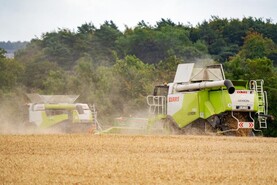While Irish farmers have faced many challenges such as foot-and-mouth disease and severe weather events in the past, they generally affected either farmgate prices or production levels.
They did not have a widespread general economic impact and, most importantly, did not affect the health and wellbeing of farmers and their families. The COVID19 crisis has the capacity to have an effect at all levels.
Possibly the biggest financial impact on a farm household is the loss of off-farm income
Thankfully, the financial impact on Irish farmers to date has been limited. However, we are now starting to see its effects, particularly for beef farmers.
There are steps farmers can take to better prepare their farm for the potential financial impact of the COVID-19 crisis.
Possibly the biggest financial impact on a farm household is the loss of off-farm income of the farmer or their partner. In these cases, seeking a moratorium or break on home loan repayments will give you a couple of months of breathing space until the worst of the difficulties have passed.
For farm finances, here are five steps you can take to prepare if you cannot sell your output when originally planned and/or farm gate prices fall significantly.
1 Know what cash your farm generated last year
To be able to assess the financial impact the current difficulties will have, farmers need to know roughly what cash surplus their farm business had left last year after living expenses, tax and financial repayments. It is also worth working out the average unit price received last year. For example, for tillage farmers, this is the average price per tonne they received for their grain.
2 Estimate the likely financial impact of delay in selling produce on your business
This mainly applies to farmers with drystock or cull animals to sell. As a result of mart restrictions, farmers may choose to hold cattle and sell later in the year instead. While this might make sense to maximise the value of the animal, it will have an impact on farm cashflow.
For example, let’s take a beef farmer who planned to sell 50 forward stores in early April for €700/head. He/she now decides to finish these animals off grass and sell instead in early August. Firstly, that farmer has €35,000 less revenue in April than planned and there is also the cost of carrying the stock over the summer.
So, while it may make sense to retain these stock to maximise value, you need to make sure you have the financial wherewithal to do so.
3 Estimate the impact of a substantial fall in output price on your business
The economic impact of the COVID-19 crisis is likely to place downward pressure on farmgate prices. How much remains to be seen, and will depend on the length and scale of the disruption. This has the potential to affect all sectors to varying degrees.
Take a 100-cow dairy farmer producing 550,000 litres as an example, and assume average milk price in 2020 is 3c/l lower than 2019. Assuming it costs the same to run the business as 2019, that farmer will have €16,500 less income this year than last.
This has potential knock-on financial implications. Can the farm business cope with €16,500 less than last year, or is there a cash reserve that can be used to fund this cash shortage?
4 Assess the financial options available to you
Your financial profile will have a big influence on what option is best for you. Farmers with bank borrowings can take a break on loan repayments which, if you have sizeable loan repayments, will help farm cashflow, particularly in dealing with reduced income if and when it arises.
However, it will be of limited benefit for those with a low level of borrowings or those who have decided to retain livestock. In these cases, additional working capital (preferably in the form of a short-term stocking loan) might be another option, particularly if farmers are planning to sell livestock later in the year. For farmers with existing stocking loans who do not have the funds to clear them, converting them into a term loan may need to be considered.
5 Talk to your bank
Farmers who will be financially affected need to engage with their bank as early as possible. Doing a small bit of analysis of your business beforehand is well worthwhile as it helps your bank put something in place that will work for you and gives the bank confidence that you are on top of your finances.
The above steps focus on farm finances only. Unfortunately, many farm households will be affected by loss of off-farm income also.
It is worth bearing in mind that, while the impact of COVID-19 is acute, its worst effects should be short-term. Taking early steps to prepare yourself financially help you cope with these short-term difficulties as effectively as possible. Above all though, the top priority for you and your family is to stay safe during this time.






 This is a subscriber-only article
This is a subscriber-only article









SHARING OPTIONS: